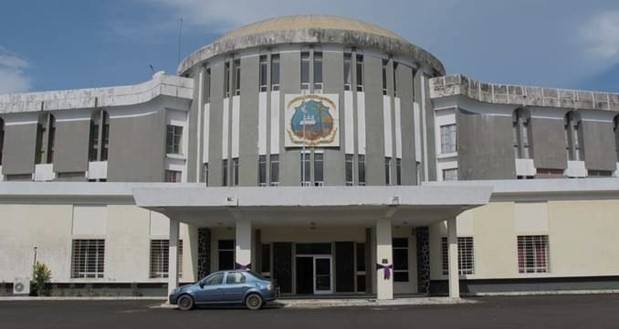MONROVIA, Montserrado – Following pressure from victim families, local and international advocacy and justice groups, as well as some U.S. congressional members, the Liberian legislature has passed a joint resolution to implement many recommendations of the Truth and Reconciliation Commission, including establishing war and economic crimes courts.
The measures are meant to bring relief to victims of atrocities committed during Liberia’s series of civil crises between January 1979 and October 2003
On April 9, the Liberian Senate voted to pass a joint resolution to establish the two courts. The resolution, which had originated from the House of Representatives, was amended by the Senate before passage and was later resent to the lower house for concurrence, an action that was taken without any delays by the representatives on April 11.
The chair of the Senate Committee on Judiciary, Sen. Augustine Chea of Sinoe, said the joint resolution considered all legal technicalities and details required to establish the two courts, compared to the House of Representatives’ version.
Grand Bassa’s Sen. Nyonblee Karnga-Lawrence, who serves as the Senate’s president pro tempore, called the move a critical step to formally close the terrible memories left behind by the civil conflict. She noted that it reinforced Liberians’ confidence in the rule of law and the administration of justice in the country.
“This decision, we believe, will bring to an end the long period of impunity for those who bear the greatest responsibility for the crimes against humanity, other violations of international humanitarian law, and other domestic crimes which occurred during the Liberian Civil War,” she said.
“We have heard all [of] the cries, the appeals, and advocacies – we have read very sad stories, and [we] understand how difficult it has been for many to heal. Many have stayed and died in exile because they have not been able to see a sign of regret and remorse for those devastating actions 21 years ago.”
The final resolution has now been forwarded to President Joseph Boakai for his approval.
Following the decision, the United States’ ambassador-at-large for global criminal justice, Beth Van Schaack, congratulated the legislature in an open letter and expressed the U.S. government’s readiness to partner in pursuit of justice in Liberia.
Schaack also congratulated Boakai and House Speaker Fonati Koffa for taking steps to implement the TRC recommendations: “Liberians have waited far too long to see justice for the horrific abuses they suffered in the country’s two civil wars, despite recommendations from your Truth and Reconciliation Commission. I applaud President Boakai for making justice such a priority in the early days of his administration.”
She added that the United States would ensure that those advocating for justice do not face threats to their safety. “Victims and witnesses must play a central role in the work of the future court, and they must be able to do so freely and safely,” she said.
The U.S. Embassy itself also praised the House of Representatives for passing the resolution, describing the move in a statement as positive news.
Speaker Koffa also described the resolution’s signing as a significant step towards ensuring accountability and justice for past atrocities and economic crimes committed in the country.
“The joint resolution, now endorsed by the chambers of the Liberian Legislature, will be forwarded to the president for his signature, signaling a unified legislative effort towards addressing the legacy of war crimes and economic malfeasance in Liberia,” said Koffa, according to a statement published by the House’s Press Bureau.
Twenty-eight of 29 senators signed the resolution, which was earlier signed by 42 of 73 members of the House of Representatives.
Some of the senators, including Amara Konneh of Gbarpolu, signed the resolution while fighting through a stream of tears. Konneh said his father and other family members were murdered during the war.
On his Facebook page, Konneh later wrote, “I voted ‘YES’ for the resolution to establish Extraordinary War and Economic Crimes Courts in Liberia.”
He continued, “For us, this is not a political adventure – my father, ‘Papa’ as I called him, was killed along with three of my youngest siblings – all males – along with two uncles and their families, friends, and neighbors I had known all my life in our once thriving village.”
Sen. Konneh, who was aged 17 at that time, added that the only crime his father and others committed was being Mandingo, one of Liberia’s ethnic groups. He accused the National Patriotic Front of Liberia, a warring faction commanded by war criminal and former president Charles Taylor between July and October 1990, of being responsible for the crimes.
“There are no burial sites for the victims to serve as memorial and comfort to me and my family,” Konneh noted. “I struggled through the grief and trauma as [a] young immigrant student at Drexel University in Philadelphia, U.S. I cried and mourned their murders, but I had to soldier on and make something of myself.”
Montserrado’s Sen. Darius Dillon also commented on the momentous occasion and what it means for the country’s future: “Our demonstration for accountability to end the culture of impunity [will] open this country to opportunities and curtail bad behavior.”
Surprise signatories of the joint resolution were Sen. Prince Johnson of Nimba and Sen. Thomas Yaya Nimely of Grand Gedeh, two of those named by the TRC as bearing greater responsibilities for the atrocities committed during the war.
Johnson founded and commanded the Independent National Patriotic Front of Liberia, which was alleged to have committed numerous crimes against humanity during the Liberian civil crisis. Nimely, on the other hand, led the Movement for Democracy in Liberia, one of the more brutal warring factions that orchestrated the last civil war that eventually drove former President Taylor out of Liberia.
Although he signed the resolution supporting the establishment of the courts, Johnson said establishing the War and Economic Crimes Courts on the basis of the TRC’s recommendations will be a mistake.
“The Supreme Court condemned the recommendations – it had so many constitutional breaches, and the Supreme Court says it violates the rights of those accused,” Johnson said. “Liberia is a country of laws and not men. If the Supreme Court rules against the recommendations that contain biases and says it is unconstitutional and unenforceable, and you in the house of elders [Senate] want to enforce it, and do something contrary, then it is a mistake.”
In 2011, the Supreme Court rendered an opinion on the recommendation placing a 30-year ban of certain individuals, from political participation, including holding elective or appointed public office, effective the date of the report. The court determined that the ban would deny those listed due process and was therefore unconstitutional.
The Court’s opinion delivered by then Chief Justice Johnny Lewis called the portion of the TRC Act directing mandatorily that the president implement all of the recommendations of the TRC is “unconstitutional, of no legal effect, and therefore unenforceable.”
Instead of implementing the war crimes court through the TRC recommendation that has long been viewed as political by some alleged war crimes perpetrators, Johnson said he wants the court established by a neutral investigative team from the U.N. The senator accused the Unity Party government of imposing the war crimes court on Liberians and targeting him in particular. He claimed that war crimes court was never a plan of the government from its inception.
However, President Boakai promised to begin the process of creating a War and Economic Crimes Court in his inaugural address on January 22.
The joint resolution approved by the legislature directed the president to seek international support to establish the courts: “The president shall write to the U.N., the E.U., and the U.S. government, expressing the Liberian government’s intention to establish the Extraordinary Criminal Tribunal on the Liberian soil and seek financial and economic support for its operations.”
The resolution also calls for the development of a legal framework for the establishment of an Anti-Corruption Court to fast-track trials of those investigated and indicted for acts of corruption and other economic crimes.
The resolution further recommends that the president offer apology on behalf of the state to the victims and the people of Liberia, work with international partners to setup a Reparation Trust Fund for victims and communities affected by the conflict, continue the National Palava Hut Program, and construct a national monument to commemorate the victims of the war as part of a renewed campaign of national reconciliation and healing.
When established, the special tribunal for war crimes will be an international domestic court with authority to prosecute individuals accused of gross human rights violations, violations serious humanitarian laws, and certain domestic crimes. An estimated 250,000 people died during the Liberian civil war, during the period January 1979 and October 2003.
Featured photo by Senate Press Bureau



